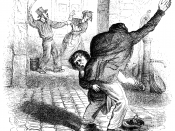Stereotypically males are much more likely to commit a crime than females. There are three main arguments to support this idea. First is the nature argument that females commit less crime because they are born to be law abiding. The nurture argument is that females commit less crime because they are socialised into being more law abiding than males. There is a third argument which suggests that female is greatly under-reported, because females are more cunning than males, and under-recorded because of the chivalry factor. Many researchers, such as Otto Pollak argue that females commit no less crimes than males, just that they are treated more leniently by the law. Other researchers like Carol Smart disagree and feel that female offenders are treated much more severely. Official statistics are well known to be flawed, and so there is no reason that the official statistics for female crime and delinquency are no entirely accurate.
In 1950 Otto Pollak argued that official statistics on gender and crime were highly misleading. According to Pollack, the statistic seriously underestimated the extent of female criminality. By examining official figures from a variety of different countries, he identified certain crimes that are usually committed by women but are particularly unlikely to be reported.
He assumed that nearly all offences of shoplifting and criminal abortions were carried out by females, and then went on to assert that such crimes were unlikely to come to the attention of the authorities. Pollack also argued that female domestic servants committed many unreported crimes.
Pollack accepted the official definitions of crime when he pointed out all the offences of prostitution that were not reported. Male clients of prostitutes were assumed to have engaged in no illegal activities.
Pollack even went as far as to suggest that women's domestic roles gave them...


